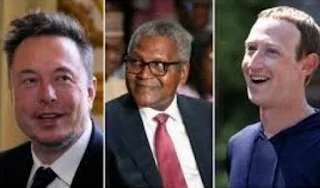ARE THE WORLD'S RICHEST GIVING BACK TO THE WORLD? AN IN-DEPTH REVIEW BY PROFILES INTERNATIONAL HUMAN RIGHTS ADVOCATE
By Daniel Okonkwo
Billionaires have amassed immense wealth through various industries, investments, and innovations. But the question remains: Are the world’s richest truly giving back, or are they merely accumulating wealth at the expense of others? Profiles International Human Rights Advocate delves into this issue to analyze the contributions of billionaires to society.
GLOBAL PHILANTHROPY: HOW THE WEALTHY GIVE BACK
Health and medical advancements. Bill Gates and Melinda French Gates, through the Bill & Melinda Gates Foundation, have invested billions in global health initiatives, including vaccine development, eradication of diseases, and access to clean water in developing countries. Their efforts have significantly impacted the fight against malaria, polio, and other infectious diseases.
Climate change and environmental conservation. The Bezos Earth Fund has pledged billions to tackle climate change. His foundation focuses on ecosystem restoration, sustainable agriculture, and reducing carbon footprints. The impact of such initiatives is crucial as the world battles climate-related disasters. Education and academic advancement. Eli and Edythe Broad have heavily funded education, particularly in science, technology, engineering, and mathematics (STEM). Many billionaires contribute to scholarships, research programs, and educational reforms, ensuring access to quality learning for underprivileged students.
Poverty alleviation and social justice. George Soros, through the Open Society Foundations, has spent billions on social justice causes, human rights initiatives, and poverty alleviation programs worldwide. His contributions have supported marginalized communities and advocated for democratic governance.
Disaster relief and emergency aid. Elon Musk has been involved in several disaster relief efforts. He provided financial aid for the Flint water crisis and donated solar-powered infrastructure to Puerto Rico after Hurricane Maria. Such contributions play a critical role in addressing humanitarian crises.
The Giving Pledge, founded by Bill Gates and Warren Buffett, encourages billionaires to donate the majority of their wealth to philanthropic causes. Many billionaires have joined this initiative, committing to long-term charitable contributions. However, not all wealthy individuals participate, raising concerns about the responsibility of the ultra-rich.
Africa's wealthiest man Aliko Dangote and Nigeria’s Wealthiest and their contributions
As Africa’s richest man, Aliko Dangote has built a vast empire through cement, sugar, and other industries. The Dangote Foundation has invested in healthcare, education, and economic empowerment initiatives in Nigeria. His philanthropic efforts include funding hospitals, scholarships, and poverty alleviation programs. However, the impact of his wealth on Nigeria's economic disparity remains debatable.
While some of Nigeria’s wealthiest individuals have engaged in corporate social responsibility (CSR) and charity, many critics argue that more could be done. Questions persist: Are these billionaires truly giving back, or are they merely maintaining the status quo to further enrich themselves?
The number of billionaires has skyrocketed over the years. According to Forbes, the first global billionaire list in 1987 included only 140 individuals. Today, there are 3,028 billionaires worldwide, with a combined net worth of $16.1 trillion—an increase of nearly $2 trillion since 2024.
The United States leads with a record 902 billionaires, followed by China (516, including Hong Kong) and India (205). This rapid increase raises concerns about wealth inequality and whether these fortunes trickle down to benefit society at large.
The debate on billionaire philanthropy remains complex. While many billionaires have made significant contributions to global well-being, skepticism persists regarding their true intentions. Are these acts of generosity genuine, or are they strategies to maintain power and influence?
Profiles International Human Rights Advocate continues to monitor and analyze these contributions, urging billionaires to take more active roles in societal development. True philanthropy should not be about publicity but about genuine impact on humanity.
By Profiles International Human Rights Advocate
 |
| ARE THE WORLD'S RICHEST GIVING BACK TO THE WORLD? AN IN-DEPTH REVIEW BY PROFILES INTERNATIONAL HUMAN RIGHTS ADVOCATE |
Comments